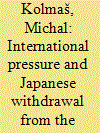|
|
|
Sort Order |
|
|
|
Items / Page
|
|
|
|
|
|
|
| Srl | Item |
| 1 |
ID:
171020


|
|
|
|
|
| Summary/Abstract |
The article tries to understand the dynamics of Japanese national identity and Abe Shinzo's revisionism. It argues that although Abe has launched the strongest ever attack on Japanese pacifist identity, there remain institutional and emotional constraints that prohibit this change from materializing. Theoretically, it tries to reconcile social constructivist and post-structural approaches to Japan's policy change and presses forward a sedimentation model that can explain the contemporary dynamics. Methodologically, the article builds on narrative analysis – it uncovers the revisionist narratives and shows how these interact with societal pressures. This is shown on two particular case studies: Abe's push for constitutional revision and Abe's attempt to transform school education. Within these case studies, the article shows that although Abe commands strong popular support and a hugely revisionist mindset, his societal and political changes have been rather limited.
|
|
|
|
|
|
|
|
|
|
|
|
|
|
|
|
| 2 |
ID:
184769


|
|
|
|
|
| Summary/Abstract |
Shaming in international relations has been extensively analysed as a normative practice that aims to persuade the target to comply with certain norms. Recently, IR scholars have identified cases, in which this process failed or antagonised the target. But although these studies have shown us how shaming works, they have not fully explained under what conditions shaming works. To remedy this, the article analyses the role of shaming in Japanese whaling controversy. In 2018, Japan announced its withdrawal from the International Whaling Commission, defying three decades of sustained international pressure. I identify two versions of shaming of Japanese whaling: premoratorium ‘soft' and post-moratorium ‘hard' shaming. The former, although less confrontational, had normative impact on Japanese society and policymaking, leading Tokyo to accept the moratorium and scale down on its whaling operations. The latter, marked by attacks of NGOs and heated discourse, had an opposite outcome and helped conservative policy entrepreneurs formulate a ‘cultural wars’ narrative that prevented the inception of anti-whaling norm. The reason for this difference, I argue, lies in Japanese domestic political culture, which played a defining role in the success/fail of shaming strategies. For shaming to be successful then, careful understanding of the target society is essential.
|
|
|
|
|
|
|
|
|
|
|
|
|
|
|
|
| 3 |
ID:
165286


|
|
|
|
|
| Summary/Abstract |
This article argues that Donald Trump’s Asian strategy hardly marks a radical transformation from Barack Obama’s ‘pivot to Asia’. This is because the ‘pivot to Asia’ never really existed. Although Obama was successful in building legitimacy for the strategy through international norms, he failed to translate his lofty rhetoric into practice. Much of his original pivot components (building a constructive relationship with China, coordinating with Asian allies and multilateralism in the Association of South East Asian Nations and the Trans-Pacific Partnership) has either failed or did not live up to expectations. Donald Trump was adamant that the Asian pivot was a bad strategy and that he would not follow it. But although he completely discarded Obama’s legitimization of the rebalance (as Trump speaks pragmatically and does not care about international norms), in actuality he has followed many of Obama’s policies, and even improved on some of them. That being said, Trump’s ‘pivot actions’ appear to be erratic, pragmatic short-term actions rather than a meticulously planned long-term strategy similar to Obama’s rebalance (which did not materialize). Thus, while Obama failed to transform the pivot into an effective strategy, neither is Trump’s effectiveness backed by a coherent Asian strategy.
|
|
|
|
|
|
|
|
|
|
|
|
|
|
|
|
|
|
|
|
|